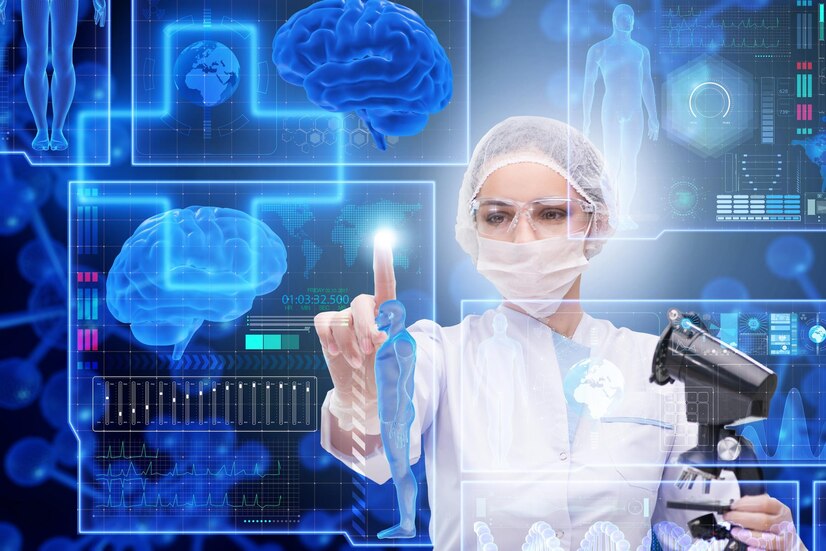
Personalized medicine in healthcare is individualized treatment plans and interventions based on a person’s specific genetic composition, way of life, and surroundings. However, with advancements in technology and the introduction of advanced intelligence tools, the healthcare industry is quickly changing to take a more individualized approach.
Big data, artificial intelligence (AI), and machine learning (ML) are at the center of this revolution because they allow us to understand intricate biological processes, identify subtle patterns, and forecast patient reactions to various therapies. These tools give medical professionals the ability to create individualized treatment programs in addition to facilitating more precise diagnoses.
In 2021, artificial intelligence (AI) in the healthcare market was worth around 11 billion U.S. dollars worldwide. It has been forecasted that the global healthcare AI market will be worth almost 188 billion U.S. dollars by 2030, increasing at a compound annual growth rate of 37% from 2022 to 2030.
In this article let’s explore the emerging tools in artificial intelligence that are revolutionizing healthcare, not being simply restricted to diagnosis.
The Power of Intelligence Tools in Healthcare: Looking Beyond Diagnostics
AI in Genomic Analysis
Genomic medicine is based in large part on genomics. The ability to swiftly and cheaply sequence the whole human genome has been made possible by recent developments in genomic sequencing technologies, creating a plethora of prospects for personalized healthcare.
To find genetic alterations and possible consequences, AI models can examine genomic, gene expression, and epigenetic data. Personalized medicine through integration with clinical data, biomarker development, enhanced accuracy, effective analysis, and detection of novel mutations are just a few benefits it provides over conventional methods.
Although the use of AI/ML tools in genomics is still at an early stage, researchers have already benefited from developing programs that assist in specific ways.
Some examples include:
- Examining people’s faces with facial analysis AI programs to accurately identify genetic disorders.
- Using machine learning techniques to identify the primary kind of cancer from a liquid biopsy.
- Predicting how a certain kind of cancer will progress in a patient.
- Identifying disease-causing genomic variants compared to benign variants using machine learning.
- Using deep learning to improve the function of gene editing tools such as CRISPR.
Clinical Decision Support Systems
Using AI and ML algorithms to power clinical decision support systems (CDSS) is another important aspect of personalized medicine. By offering personalized, evidence-based suggestions in real-time, these systems are intended to help healthcare providers make well-informed decisions.
A patient’s medical history, test results, and other pertinent data can all be analyzed by CDSS to create customized treatment regimens, recommend tests for diagnosis, and warn doctors of possible dangers or problems.
A study that was published in the journal “Npj Digital Medicine” claims that these intelligent systems can help increase patient outcomes, optimize treatment plans, and improve diagnostic accuracy by drawing on the collective knowledge found in large databases of clinical guidelines and medical literature.
Treatment Optimization
To determine the best courses of action for specific patients, AI systems may examine enormous volumes of patient data, including genetic data, medical records, and treatment results.
AI understands the basic fact that no two patients are the same. AI is making it possible to create individualized treatment regimens by evaluating patient data, including genetics, lifestyle, and environmental factors.
For example, Novartis created a medication for cancer therapy that uses cutting-edge machine-learning algorithms to determine which individuals will benefit from the medication. With less chance of adverse effects for patients, the organization can offer more individualized and efficient therapies thanks to this creative method.
AI in Predictive Modeling
AI can be used to create prediction models that foretell the course of diseases and project future medical requirements. Artificial intelligence (AI) algorithms can assist healthcare providers in taking early action, potentially averting the beginning of diseases or complications before they arise, by evaluating longitudinal patient data and identifying risk factors.
According to research published in “Discover Artificial Intelligence”, AI techniques in predicting numerous diseases such as cancers, heart, lung, skin, genetic, and neural disorders, perform more precisely compared to specialists without human error. Patients can obtain preventative care and take steps to improve their health before the illness worsens by identifying potential hazards early on.
Drug Discovery and Development
The process of finding new drugs is incredibly difficult and time-consuming. Obtaining regulatory approval and identifying a precise target linked to a certain disease can take over ten years. Moreover, the price of developing new medications is rising. It rose by 15% from 2021 to 2022, reaching $2.3 per drug on average.
By finding promising drug candidates more quickly and improving drug design, AI-driven methods are transforming the process of drug discovery and development.
In order to find new drug targets, anticipate drug interactions, and expedite the drug development process, machine learning models can analyze enormous databases of molecular structures, biological pathways, and clinical trial data, according to research published in “Drug Discovery Today“. This may expedite the creation of individualized treatments for particular patient populations.
Remote Monitoring and Telemedicine
Outside of conventional healthcare settings, patients’ health status can be continuously monitored thanks to AI-powered remote monitoring systems and telemedicine platforms. These systems can follow vital signs, identify irregularities, and give patients and healthcare providers real-time feedback by combining wearable technology, sensors, and AI algorithms.
Woebot Health, for instance, created a chatbot that employs AI to assist patients in managing mental health concerns. Using natural language dialogue, the chatbot converses with patients to assist with symptom management, coping skills practice, and emotional support. In the end, better patient outcomes can result from patients feeling more connected to their healthcare providers because of this kind of individualized, on-demand support.
Challenges and Opportunities
There are several challenges that need to be addressed before intelligence tools completely acquire healthcare.
Data privacy and security
Patient data gathering and analysis are critical to the application of AI in pharmaceuticals. This raises questions regarding data security and privacy, particularly in light of how sensitive health information is. Businesses are responsible for making sure patient privacy is maintained at all times and that patient data is stored securely.
To reduce the dangers, for instance, encryption and access restrictions can be put in place, and data protection laws like GDPR in Europe and HIPAA in the US can be followed.
Ethical Considerations and Bias Mitigation
The growing integration of AI technologies in healthcare necessitates addressing ethical issues and minimizing potential biases in algorithmic decision-making. This entails eliminating biases that may result from unbalanced datasets or computational algorithms, encouraging openness and accountability in AI systems, and guaranteeing the ethical acquisition and use of patient data.
Personalized medicine can be made more egalitarian and accessible for all patients by putting ethical values first and encouraging diversity and inclusivity in AI development.
Integration and implementation
Integrating AI into existing pharma workflows can be challenging. It requires significant changes to infrastructure, processes, and culture, and may face resistance from stakeholders who are unfamiliar with AI technology.
Summing it up
In conclusion, a paradigm shift toward personalized medicine is being driven by the convergence of genetics, big data, artificial intelligence, and clinical informatics. Using data-driven insights and intelligent tools, healthcare practitioners can provide more accurate, efficient, and patient-centered treatment than in the past.
Codewave EIT works with hospitals, healthcare organizations, and connected industries helping them reimagine their digital future with a unique data strategy driving high patient engagement and integrating technologies & tools into their organizational processes, to deliver maximum patient value.
Our AI-based offerings for Healthcare :
– Electronic medical record management app development
– Patient data digitization and cloud analytics
– Patient profiling, big data analysis, doctor insights
– Patient-doctor engagement platform, online consulting
– IoT for sensing data of patients under observation & cloud analytics
– Predictive modeling & analysis of patterns in health data
If you wish to make your healthcare organization to be AI-updated, you can talk to us to explore our range of solutions. Let’s make healthcare smarter for the betterment of all.
